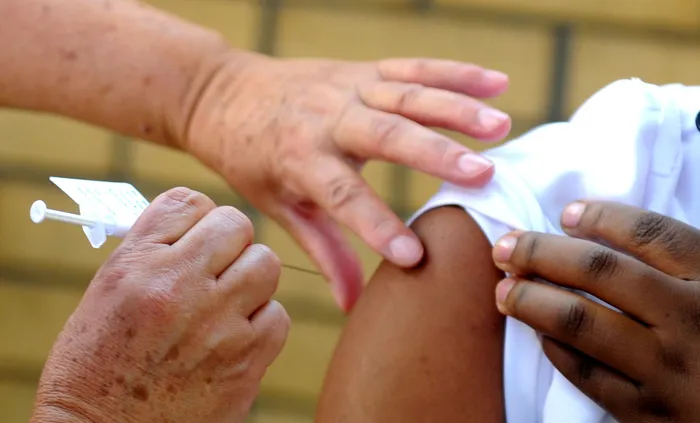Experts warn the next Covid-19 wave will be worse than the last

While Covid-19 cases are increasing in the country, experts say the new variants detected in South Africa were not driving the surge. A health worker receives a Covid-19 vaccine. Photographer Ayanda Ndamane African News Agency (ANA)
DURBAN - EXPERTS have warned that the increase in Covid-19 cases in the country is a concern and if the spread is not contained, a third wave – worse than the last one – is likely to occur.
The experts, however, said the new variants detected in South Africa were not driving the surge.
This comes after Health Minister Dr Zweli Mkhize confirmed Covid19 variants dominant in India and the UK had been detected in South Africa.
Mkhize said of the 11 cases of the B.1.1.7 variant first detected in the UK, eight were detected in the Western Cape, with two having a history of travel from Bahrain, one was detected in KwaZulu-Natal and two in Gauteng.
He said of the four cases of the B.1.617.2 variant first detected in India, two were found in Gauteng and two in KZN.
“All cases have been isolated and managed according to national Covid19 case management guidelines and contact tracing has been performed in order to limit the spread of this variant,” said Mkhize.
He said the “Indian variant” was detected in community samples which suggested that community transmission of B.1.1.7 has already set in.
Professor Thumbi Ndung’u, deputy director of the African Health Research Institute, said the rise in the number of Covid-19 cases was particularly of concern now with winter around the corner.
Ndung’u warned the South African Covid-19 modelling consortium was predicting the third wave might be worse than the second one.
“Now is the time to fully comply with Covid-19 protocols,” he said.
Ndung’u said it was highly unlikely South Africa could avoid new variants emerging or being transmitted as long as people were being infected.
“With vaccination rates being so low so far, behaviour change and the non-pharmaceutical interventions must remain our best weapon,” he said.
Dr Ridhwaan Suliman, senior researcher at the Council for Scientific and Industrial Research, said there had been a sustained and steady increase in cases for at least a month.
“We can’t blame it on imported variants, it’s local transmission that has been on the increase,” he said.
However, he said the imported variants could exacerbate the problem.
Suliman said that from his understanding, the “Indian variant” was highly transmissible but not necessarily more dangerous than the variant dominant in South Africa.
He said while the country had seen an increase in the number of confirmed cases this week, it had not entered the third wave yet.
“The concern is still there, and the increases that we are seeing now are warning signs of a possible third wave should we not be able to contain the current increases,” he said.
Suliman said the seven-day average for the past week showed more than 1 700 new cases a day across the country. He said the number of cases had increased by over 41% compared with a week ago.
“The increase is being driven by increases in the most densely populated province of Gauteng ... that’s driving the national numbers at the moment,” said Suliman.
He said over the past week, Gauteng had shown a significant increase, adding that numbers rose quickly in densely populated areas. Suliman said there had also been sustained increases in the Free State and the Northern Cape was trending upwards again.
“Those two provinces have been of concern since after Easter,” he said.
Meanwhile, AFP reported that the Covid-19 variant B.1.617.2, spreading in India was more contagious and may be dodging vaccine protections, contributing to that country’s explosive outbreak, the World Health Organization’s chief scientist has said.
Soumya Swaminathan warned that “the epidemiological features that we see in India today do indicate that it’s an extremely rapidly spreading variant”.
THE MERCURY
Related Topics: